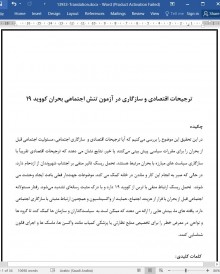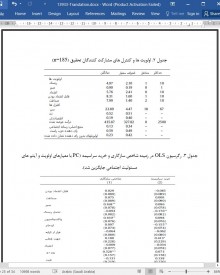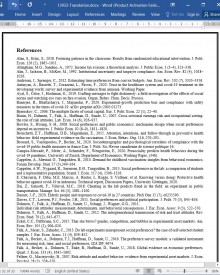
دانلود مقاله ترجیحات اقتصادی و سازگاری در آزمون تنش اجتماعی بحران کووید ۱۹
چکیده
در این تحقیق این موضوع را بررسی میکنیم که آیا ترجیحات اقتصادی و سازگاری اجتماعی، مسئولیت اجتماعی قبل از بحران را برای مقررات سیاسی پیش بینی میکنند یا خیر. نتایج نشان می دهند که ترجیحات اقتصادی تقریباً با سازگاری سیاست های مبارزه با بحران مرتبط هستند. تحمل ریسک تاثیر منفی بر اجتناب شهروندان از ازدحام دارد، در حالی که صبر به انجام این کار و ماندن در خانه کمک می کند. موضوعات جهتدار فعلی باعث ایجاد وحشت می شوند. تحمل ریسک ارتباط منفی با ترس از کووید 19 دارد و با درک مثبت رسانهای تشدید میشود. رفتار مسئولانه اجتماعی قبل از بحران با فرار از هزینه، اجتماع، حمایت از واکسیناسیون و همچنین ارتباط مثبتی با سازگاری اجتماعی دارد. یافته های ما، بینش هایی را ارائه می دهند که ممکن است به سیاستگذاران و سازمان ها کمک کند تا گروه ها و نواحی در معرض خطر را برای تخصیص منابع نظارتی یا پزشکی کمیاب مانند واکسن ها، ماسک ها و اجرای قانون شناسایی کنند.
1. مقدمه
بسیاری از سران کشورها، بیماری همه گیر ویروس کووید 19 را بعنوان بزرگترین چالش از زمان جنگ جهانی دوم تا بحال در نظر می گیرند. در سراسر جهان، اقدامات سیاسی در اصل با هدف شکستن زنجیره انتقال اجرا شده است. با گذشت زمان، اقدامات از اقدامات نرم اولیه مانند دستورالعمل های ضدعفونی بیشتر از توصیه های رفتاری برای مرزهای بسته و مقررات منع رفت و آمد تنظیم میشوند. مهم نیست که چگونه مدیریت دولتی به شدت رفتار صحیح را تشویق می کند، یا چگونه مجازات احتمالی نافرمانی مدنی را تشدید می کند، موفقیت این اقدامات در نهایت به سازگاری اجتماعی در حال انجام افراد بستگی دارد.
سازگاری اجتماعی پایبندی افراد به مقررات و توصیه های مربوط به مشارکت در بهداشت عمومی است. این موضوع با ادبیات مربوط به مشارکت های فردی برای تهیه کالاهای عمومی و تحقیق در مورد سازگاری فردی به عنوان مثال با توجه به تعهدات مالیاتی (بعنوان مثال، آلینگهام و ساندمو، 1972؛ آلم و همکاران، 1992؛ کیرچلر، 2007)، استانداردهای فرآیند در شرکت ها (بعنوان مثال، پیرس و همکاران، 2015؛ استاتس و همکاران، 2017؛ شیدی و همکاران، 2019) یا واکسیناسیون (بعنوان مثال، برونچتی و همکاران، 2015؛ هانسن و اشمیتبلاچر، 2019) مرتبط است. با این حال، تنها سهم اندکی از این ادبیات بر عوامل محرک فردی سازگاری در یک زمینه عمومی مناسب تمرکز می کند. علاوه بر این، اطلاعات بسیار کمی درباره ترجیحات در یک وضعیت بحرانی وجود دارد، نسبت به آنچه که بیشتر شهروندان تجربه نکرده اند.
اهمیت ترجیحات فردی با درخواستهای سیاستمداران برای تمکین اجتماعی در این بحران نشان داده می شود. بعنوان مثال، سیاستمداران درخواست میکنند که شهروندان باید از ایجاد وحشت خودداری کنند تا به صورت ایمن کالاهای روزمره خود را تامین کنند. علاوه بر این، سیاستمداران از مقررات مربوط به اجتماعات عمومی و مقررات منع رفت و آمد برای افزایش فاصله اجتماعی استفاده می کنند، این ابزار کلیدی باعث شکسته شدن زنجیره انتقال میشود. پایبندی به رفتارهای تجویز شده و توصیه شده خطر ابتلا را کاهش می دهد اما همچنان نیاز به صبر و نظم و ترتیب دارد. بنابراین، سازگاری اجتماعی شامل رفتاری است که احتمالا با زمان فردی و ترجیحات ریسک تشدید می یابد. این ایده با شواهدی از زمینه های مرتبط با سلامتی پشتیبانی می شود که نشان دهنده این موضوع است که صبر تاثیر مثبتی بر پیروی از توصیه های مربوط به فعالیت بدنی دارد (وان در پل و همکاران، 2017)، در حالیکه افرادی با تحمل ریسک بیشتر به احتمال زیاد به داروها پایبند نیستند (سیمون-تووالت و همکاران، 2018). سازگاری شهروندان نیازمند این است که آنها به مناسب بودن اقدامات و قابلیت اطمینان اطلاعات ارائه شده اعتماد کنند (آنتینیان و همکاران، 2020). از آنجا که سازگاری، نتایج مثبت دیگری را برای سایر افراد جامعه ایجاد میکند، ممکن است به تمایل شهروندان برای پذیرش مسئولیت اجتماعی نیز بستگی داشته باشد.
4. نتیجه گیری
موفقیت اقدامات سیاست گذاری برای مبارزه با بیماری همه گیر COVID-19 و بنابراین شدت اقتصادی بحران تا حد زیادی به سازگاری شهروندان وابسته است. این تحقیق، بینش هایی را در مورد عوامل محرک سازگاری شهروندان با مقررات عمومی و پیشنهاد های رفتاری ارائه می دهد. از یک طرف، ما بر روی معیارهای استاندارد ترجیحات اقتصادی با توجه به زمان، ریسک، اعتماد و صداقت به عنوان توصیف های احتمالی سازگاری شرکت کنندگان تمرکز می کنیم. از طرف دیگر، ما بر مسئولیت اجتماعی شرکت کنندگان قبل از بحران تمرکز می کنیم. یافته های اصلی ما این است که صبر و مسئولیت اجتماعی با سازگاری بالاتر اجتماعی مرتبط هستند. در حالی که، شرکت کنندگان متحمل ریسک و گرایش به یک جهت خاص، به ترتیب سازگاری کمتری با ازدحام جمعیت و خرید سراسیمه نشان می دهند.
مجموعه موضوعات دانش آموزی ما احتمالاً خطای اندازه گیری را کاهش می دهد (اسنوبرگ و یاریو، در آینده) و به ما امکان می دهد قبل از بحران از داده های مربوط به همان موضوع استفاده کنیم. نگرانی کلی درباره نمونه های دانش آموزی، قابلیت تعمیم محدود نتایج احتمالی ما است. ابتدا، ما داده های قدیمی را از مجموعه اشخاص یکسان با اقدامات اولویتی استخراج می کنیم و در بخش 3.1 نشان می دهیم که هیچ تفاوت آماری معنی داری در مورد اقدامات نظرسنجی وجود ندارد. بنابراین، ما می توانیم یک اثر انتخاب نمونه را در سطح مجموعه افراد خود رد کنیم. دوم، داده های ما از یک گروه موضوعی بدست می آید که عمدتا از دانشجویان تشکیل می شود. استفاده از مجموعه موضوعات دانشجویی از جنبه های مختلف برای تحلیل ما از اهمیت برخوردار است. از یک طرف، به ما این امکان را می دهد تا ترجیحات استخراج شده در نظرسنجی را با داده های قدیمی مقایسه کنیم. ما قبل از شروع بحران ، این داده ها را در آزمایش های کنترل شده آزمایشگاهی با دانش آموزان از همان گروه درسی به دست آوردیم. از طرف دیگر ، استخرهای موضوعی دانش آموزان کمتر در معرض خطای اندازه گیری هستند که این موضوع می تواند تحلیل را مغرضانه جلوه دهد (اسنوبرگ و یاریو ، آینده).
Abstract
We analyze in a survey study whether economic preferences and pre-crisis social responsibility predict social compliance to the policy regulations. Results show that economic preferences are closely related to compliance with policies fighting the crisis. Risk tolerance negatively affects citizens’ avoidance of crowds, whereas patience helps to do so and to stay home. Present-biased subjects engage in panic buying. Risk tolerance is negatively related with the fear of COVID-19 and trust positively resonates with positive media perception. Pre-crisis social responsible behavior related to fare evasion, turnout, support of vaccination is also positively related with social compliance. Our findings offer insights, which may help policy-makers and organizations to identify risk groups and regions for the allocation of scarce medical or surveillance resources, such as vaccines, masks, and law enforcement.
1. Introduction
Many heads of states consider the COVID-19-virus pandemic as the greatest challenge since World War II. Worldwide, policy measures have been implemented mainly targeting at breaking the chain of transmission. Over time, measures were adjusted from initially soft measures, such as disinfection guidelines over behavioral recommendations to closed borders and curfews. No matter how strongly public administration encourages the right behavior, or how severe the potential punishment in case of civil disobedience, the success of these measures ultimately depends on the ongoing social compliance of the people.
Social compliance constitutes individual adherence to the regulations and recommendations regarding contributions to public health. It is related to the literature on individual contributions to the provision of public goods2 and to the research on individual compliance, for example, with respect to tax obligations (e.g., Allingham and Sandmo, 1972; Alm et al., 1992; Kirchler, 2007), process standards in firms (e.g., Pierce et al., 2015; Staats et al., 2017; Sheedy et al., 2019), or vaccination (e.g., Bronchetti et al., 2015; Hansen and Schmidtblaicher, 2019). However, only a small share of this literature focuses on individual drivers of compliance in a public-good context. Furthermore, very little is known about the role of individual preferences for compliance in a crisis situation to what most citizens have not been close to experience.
The importance of individual preferences is demonstrated by politicians’ requests for social obedience in the crisis. For instance, politicians appeal that citizens should refrain from panic buying to secure the provision of daily goods. Moreover, politicians apply regulations on public gatherings and curfews to increase social distancing, the key instrument to break the chain of transmission. Sticking to the prescribed and recommended behavior reduces the risk of getting infected, but also requires patience and selfdiscipline. Thus, social compliance constitutes a behavior which is likely to resonate with individual time and risk preferences. This idea is supported by evidence of health-related contexts, highlighting that patience positively affects the adherence to physical activity advice (Van Der Pol et al., 2017), whereas more risk tolerant subjects are less likely to adhere to medications (Simon-Tuval et al., 2018). Compliance requires from citizens that they trust the appropriateness of the measures and the reliability of the provided information (Antinyan et al., 2020). Since compliance generates positive externalities for other members of the society, it might also depend on citizens’ willingness to take over social responsibility.
4. Conclusion
The success of the policy measures to fight the COVID-19 pandemic and therefore the economic severity of the crisis depend to a large extent on citizens’ compliance. This study provides insights into the individual drivers of citizens’ compliance with the public regulations and behavioral recommendations. We focus, on the one hand, on standard measures of economic preferences with respect to time, risk, trust, and honesty as potential explanations of participants’ compliance.13 On the other hand, we focus on participants’ social responsibility taken before the crisis. Our main findings are that patience and social responsibility are related to higher social compliance. Whereas, risk tolerant and presentbiased participants show lower compliance in the form of avoidance of crowds and panic buying, respectively. Our student subject pool is likely to reduce measurement error (Snowberg and Yariv, forthcoming) and it allows us to exploit data from the same subject pool before the crisis.
A general concern with student samples is the potential limited generalizability of our results. First, we exploit old data from the same subject pool on preference measures and showed in Section 3.1 that we find no statistically significant differences to the survey measures. Thus, we can rule out a sample-selection effect at the level of our subject pool. Second, our data are obtained from a subject pool, which mainly consists of students. Applying a student subject pool is of importance for our analysis for several aspects. On the one hand, this allows us to compare the elicited preferences in the survey to old data. We obtained these data in controlled laboratory experiments with students from the same subject pool before the crisis started. On the other hand, student subject pools are less prone to measurement error, which can bias the analysis (Snowberg and Yariv, forthcoming).
چکیده
1. مقدمه
2. داده ها و طراحی تحقیق
2.1.تحلیل داده و روایی ساختار
3. نتایج
3.1. نمونه و مقایسه با داده های قدیمی
3.2. نتایج اصلی: سازگاری اجتماعی تحت کووید 19
3.2.1. درک کووید 19
3.3. بررسی های استواری
4. نتیجه گیری
ضمیمه A. جدول ها و شکل ها
ضمیمه B. سوالات نظرسنجی انلاین
منابع
Abstract
1. Introduction
2. Data and study design
2.1. Data analysis and construct validity
3. Results
3.1. Sample and comparison with old data
3.2. Main results: social compliance under COVID-19
3.2.1. Perception of COVID-19
3.3. Robustness checks
4. Conclusion
Acknowledgements
Appendix A. Tables and figures
Appendix B. Questions of the online survey
References
- اصل مقاله انگلیسی با فرمت ورد (word) با قابلیت ویرایش
- ترجمه فارسی مقاله با فرمت ورد (word) با قابلیت ویرایش، بدون آرم سایت ای ترجمه
- ترجمه فارسی مقاله با فرمت pdf، بدون آرم سایت ای ترجمه



